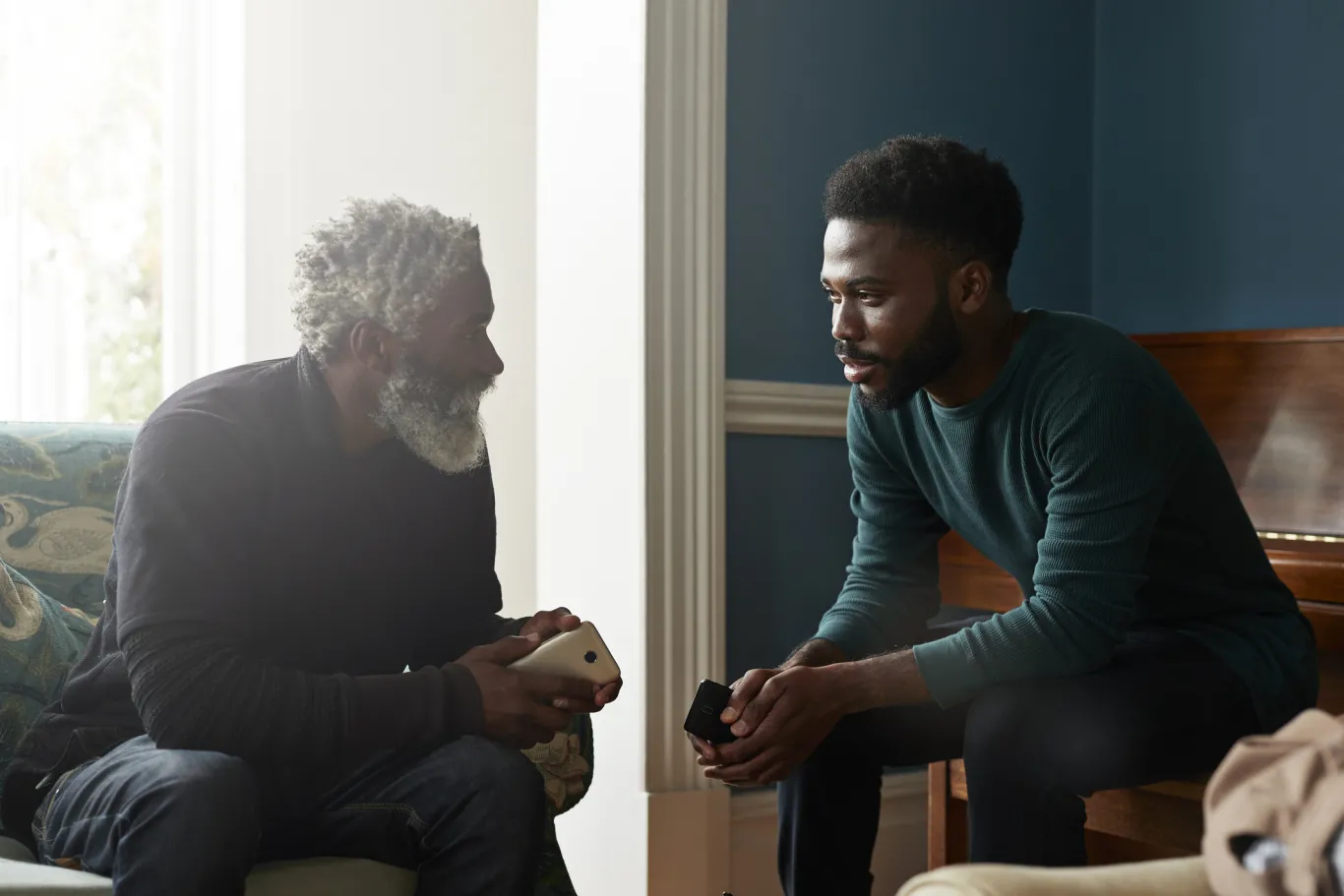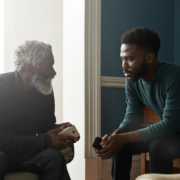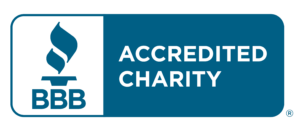Peer Support for Black Cancer Patients Opens Doors to Clinical Trials Diversity

Stock photo posed by models: Getty Images
Black and African American cancer patients represent only 5% of clinical trial participants. Our peer support program is working to change that by increasing clinical trial awareness & knowledge among Black and African American cancer patients like Cae.
“I was able to get the voice back that I feel like I lost throughout my whole deal with cancer.”
— Cae, Peer Clinical Trials Support Program participant
Existing barriers make it difficult for many underrepresented communities to participate in cancer clinical trials. Improving clinical trials diversity is extremely important. Everyone should have the chance to benefit equally from new, possibly life-saving treatments.
We know that knowledge, awareness, and trusted peer support can increase clinical trial participation. Our Peer Clinical Trials Support Program helps Black and African American cancer patients learn more about clinical trials through one-on-one support from an experienced Peer Specialist ― a Black or African American cancer patient or survivor who has participated in a cancer clinical trial.
In the following Q&A, we talk with Cae, a cancer patient who participated in our Peer Clinical Trials Support Program. Cae shares a few things she learned from her Peer Specialist and why she ultimately decided to join a cancer clinical trial:
1. Could you briefly describe your cancer diagnosis?
I was originally diagnosed with CLL [chronic lymphocytic leukemia] in March of 2021. I got diagnosed with breast cancer in October of 2021. So, the leukemia metastasized and affected my left breast. I haven’t had any surgery yet, but I am actively still doing chemotherapy.
My diagnosis was a surprise with the breast cancer because I didn’t have any symptoms or anything. The only thing I had were lumps, and I thought the lumps were caused by the chemotherapy I was doing because of the leukemia.
When I finally brought it to my doctor’s attention, he had me get tests done. I can’t tell you how many tests I had done. And then finally he said yes, it’s breast cancer. It was just kind of shocking because, at the time, I was only 25, so it was very surprising for me.
2. After your diagnosis, did anyone talk with you about cancer clinical trials as an option? Or did you experience other barriers to learning about clinical trial opportunities?
My biggest barrier honestly — and this is the reason why my doctor never brought trials or anything to me — is because a lot of the trials were local in my area, [and] insurance doesn’t cover the trials.* So, there are trials that either the facility has to pay for you to do, or you have to pay the facility in order to participate. And I have horrible insurance. That was a barrier that I already had — just getting my basic needs taken care of.
So, my doctor never brought up the idea of trials because he didn’t want me to have the idea of financial hardship with having to deal with that, if there was a possibility that facility didn’t offer [to pay to get a treatment done] because it’s experimental.
*Editor’s Note: Insurance coverage for clinical trial participation varies based on an individual’s insurance company and policy. Clinical trials usually cover the cost of participation. Some individuals need to travel to the facility where the trial is held if it is not available where they live. Coverage for travel costs may vary by trial.
3. How did you find out about our Peer Clinical Trials Support Program?
I was just looking online for different support programs that could offer me any type of help or resources or information to help me. Because I got diagnosed late in my CLL, and also kind of late stages into my breast cancer, I already know there are only limited options available for me.
I was just really interested in finding out, “Okay, what else is there past just what my doctor can do, more than just what I know.”
And I just stumbled across [the Peer Clinical Trials Support Program] and sent an email and said, “Hey, I want more information if you guys can give me anything to help me.” And they called me, and honestly, it was one of the most relieving calls I got during this whole process and dealing with cancer.
4. In this program, Peer Specialists use their own experience as a Black or African American cancer patient and cancer clinical trial participant to support others who are interested in learning about cancer clinical trials. What were some questions you had about clinical trials? And what were some helpful things you learned from your Peer Specialist?
I didn’t originally have specific questions. But they were able to open the door for dialogue with me to where I could say, “Okay, well, I do have a question.”
And most of my questions were, “What are trials? What are things I should look for in trials that are good and trials that are bad? How do I know if this trial is a legit trial, and they’re not just trying to take my information or my blood samples?”
My Peer Specialist was able to explain to me what to look for and how I could look on a website where they have all the trials* and they’ll tell you which ones are open and who’s doing what, who’s the lead investigator.
I found that helpful because I could actually fact check and look into it: What are they doing? Who are they? [That] was helpful for me because one of my biggest worries with getting into a trial was being taken advantage of, or not knowing if I’m actually being a part of something that may help, or are these people just trying to use me as a guinea pig and they aren’t doing anything helpful.
*Editor’s Note: The National Cancer Institute and ClinicalTrials.gov are 2 well-known resources that provide information and details about clinical trials for all types of cancer. Most clinical trials are listed on both sites.
“I didn’t originally have specific questions. But they were able to open the door for dialogue with me to where I could say, ‘Okay, well, I do have a question.’”
— Cae, Peer Clinical Trials Support Program participant
5. After taking part in this program, you went on to join a cancer clinical trial. How did this program help support your decision-making process?
It made me more confident in my choice, that I was making a good choice. It made me feel like I have a right to voice my opinion. I’m still actively in trial now, [and] it gave me my voice where, if something’s going on, I actually talk to the people that are working with me and [say], “Hey, I’m having this symptom” or “I’m having this going on,” without feeling like I can’t say anything or I just have to accept how it is and deal with it.
With this support system, my Peer Specialist [said] if something is bothering you, let people know. I was able to get the voice back that I feel like I lost throughout my whole deal with cancer.
A big part of me lost my voice because I felt defeated, because so often doctors and people weren’t listening to me or didn’t take what I had to say seriously. And so, I felt like, okay, if they don’t, nobody’s not. So, with that, it built my confidence back a lot just to be able to interact and talk with the trial experts.
“It made me more confident in my choice, that I was making a good choice. It made me feel like I have a right to voice my opinion.”
— Cae, Peer Clinical Trials Support Program participant
6. Are there any words of support you would like to share with other Black or African American cancer patients who may be considering participating in a cancer clinical trial?
Don’t let your previous interactions with specialists or doctors discourage you from having a better experience. Every doctor and specialist is not the same, and you will find someone who will listen to you, because you are worthy of having someone hear your voice.
Discover More About Our Peer Clinical Trials Support Program





